Why should we not be surprised!
At the power of smell that a dog has.
I have written about the dog’s nose before. Or rather I have written about the dog’s sense of smell;
Dogs’ noses just got a bit more amazing. Not only are they up to 100 million times more sensitive than ours, they can sense weak thermal radiation—the body heat of mammalian prey, a new study reveals. The find helps explain how canines with impaired sight, hearing, or smell can still hunt successfully.
But I wanted to draw your attention to an article in 2017; June 26th to be precise. In an article called What a nose!
Here’s how that post opened.
Two items that recently caught my eye.
The power of a dog’s nose is incredible and it is something that has been written about in this place on more than one occasion.
But two recent news items reminded me once again of the way we humans can be helped by our wonderful canine partners.
The first was a report that appeared on the Care2 website about how dogs are being used to search for victims in the burnt out ruins following that terrible Grenfell Tower fire. That report opened, thus:
By: Laura Goldman June 24, 2017
About Laura Follow Laura at @lauragoldmanWearing heat-proof booties to protect their feet, specially trained dogs have been dispatched in London’s Grenfell Tower to help locate victims and determine the cause of last week’s devastating fire that killed at least 79 people.
Because they’re smaller and weigh less than humans, urban search-and-rescue dogs with the London Fire Brigade (LFB) are able to access the more challenging areas of the charred 24-story building, especially the upper floors that sustained the most damage.
Because I read recently, on the EarthSky website, about dogs in Australia that are being trained to detect Covid-19 in humans.
ooOOoo
These dogs are trained to sniff out the coronavirus
Posted by Eleanor Imster in Human World, August 10, 2020
Scientists have been working with professional trainers in South Australia, Victoria and New South Wales to train dogs to sniff out Covid-19. Most of the dogs have a 100% success rate.
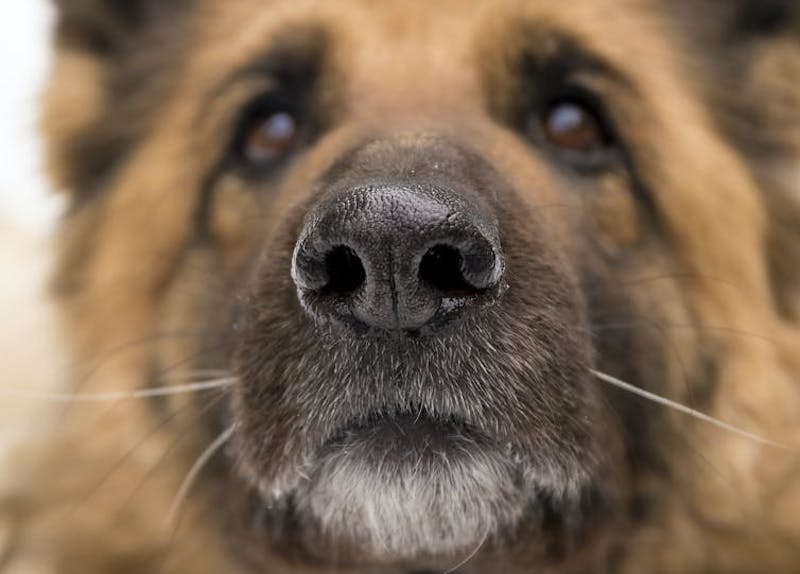
Susan Hazel, University of Adelaide and Anne-Lise Chaber, University of Adelaide
What does a pandemic smell like? If dogs could talk, they might be able to tell us.
We’re part of an international research team, led by Dominique Grandjean at France’s National Veterinary School of Alfort, that has been training detector dogs to sniff out traces of the novel coronavirus (SARS-CoV-2) since March.
These detector dogs are trained using sweat samples from people infected with Covid-19. When introduced to a line of sweat samples, most dogs can detect a positive one from a line of negative ones with 100% accuracy.
Across the globe, coronavirus detector dogs are being trained in the United Arab Emirates (UAE), Chile, Argentina, Brazil and Belgium.
In the UAE, detector dogs – stationed at various airports – have already started helping efforts to control Covid-19’s spread. This is something we hope will soon be available in Australia too.
A keen nose
Our international colleagues found detector dogs were able to detect SARS-CoV-2 in infected people when they were still asymptomatic, before later testing positive.
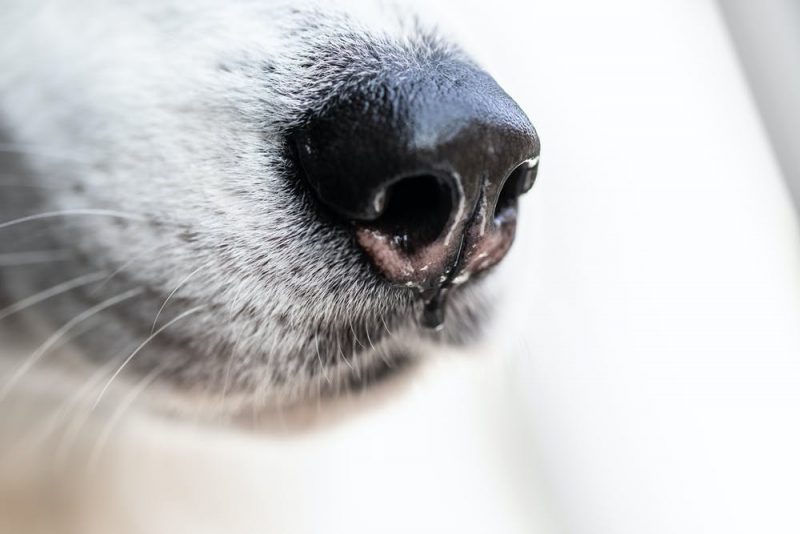
When it comes to SARS-CoV-2 detection, we don’t know for sure what the dogs are smelling.
The volatile organic compounds (VOCs) given off in the sweat samples are a complex mix. So it’s likely the dogs are detecting a particular profile rather than individual compounds.
Sweat is used for tests as it’s not considered infectious for Covid-19. This means it presents less risk when handling samples.
Covid-19 sniffing dogs in Australia
Here in Australia, we’re currently working with professional trainers of detector dogs in South Australia, Victoria and New South Wales. The most common breed used for this work so far has been the German shepherd, with various other breeds also involved.
We are also negotiating with health authorities to collect sweat samples from people who have tested positive for the virus, and from those who are negative. We hope to start collecting these within the next few months.
We will need to collect thousands of negative samples to make sure the dogs aren’t detecting other viral infections, such as the common cold or influenza. In other countries, they’ve passed this test with flying colors.
Once operational, detector dogs in Australia could be hugely valuable in many scenarios, such as screening people at airports and state borders, or monitoring staff working in aged care facilities and hospitals daily (so they don’t need repeat testing).
To properly train a dog to detect SARS-CoV-2, it takes:
– 6-8 weeks for a dog that is already trained to detect other scents, or
– 3-6 months for a dog that has never been trained.
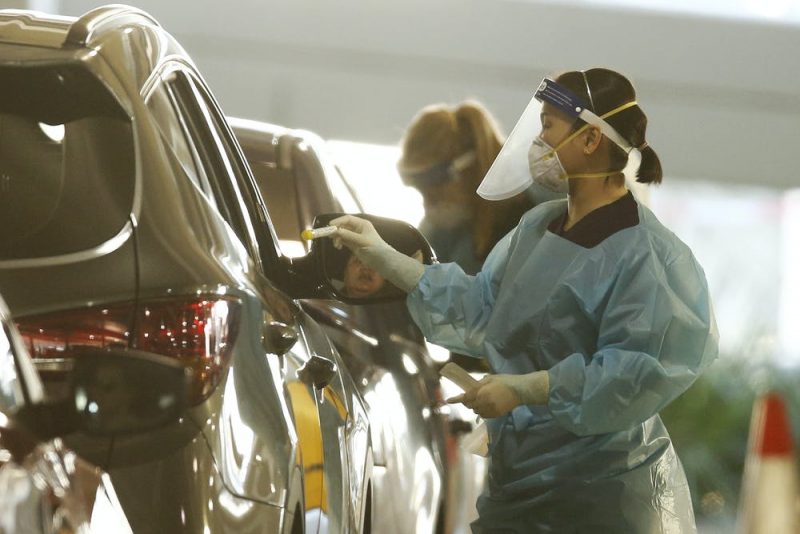
Could the dogs spread the virus further?
Dogs in experimental studies have not been shown to be able to replicate the virus (within their body). Simply, they themselves are not a source of infection.
Currently, there are two case reports in the world of dogs being potentially contaminated with the Covid-19 virus by their owners. Those dogs didn’t become sick.
To further reduce any potential risk of transmission to both people and dogs, the apparatus used to train the dogs doesn’t allow any direct contact between the dog’s nose and the sweat sample.
The dog’s nose goes into a stainless steel cone, with the sweat sample in a receptacle behind. This allows free access to the volatile olfactory compounds but no physical contact.
Furthermore, all the dogs trained to detect Covid-19 are regularly checked by nasal swab tests, rectal swab tests and blood tests to identify antibodies. So far, none of the detector dogs has been found to be infected.
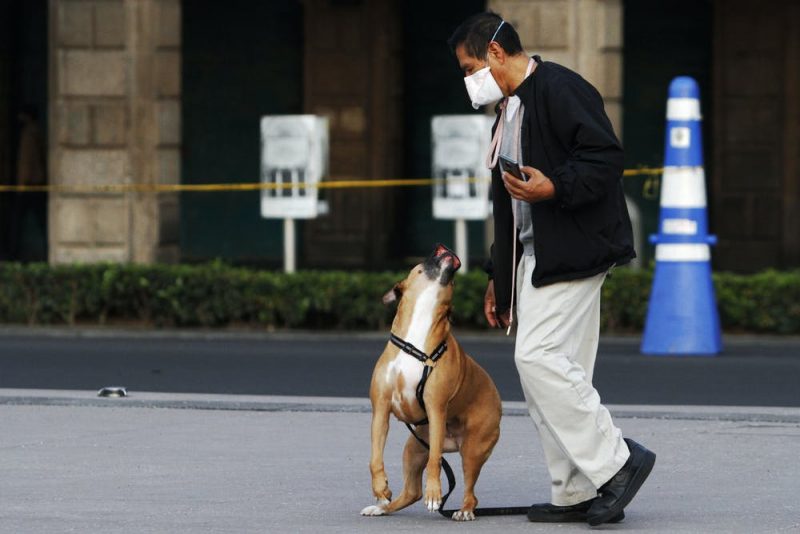
Hurdles to jump
Now and in the future, it will be important for us to identify any instances where detector dogs may present false positives (signaling a sample is positive when it’s negative) or false negatives (signaling the sample is negative when it’s positive).
We’re also hoping our work can reveal exactly which volatile olfactory compound(s) is/are specific to Covid-19 infection.
This knowledge might help us understand the disease process resulting from Covid-19 infection – and in detecting other diseases using detector dogs.
This pandemic has been a huge challenge for everyone. Being able to find asymptomatic people infected with the coronavirus would be a game-changer – and that’s what we need right now.
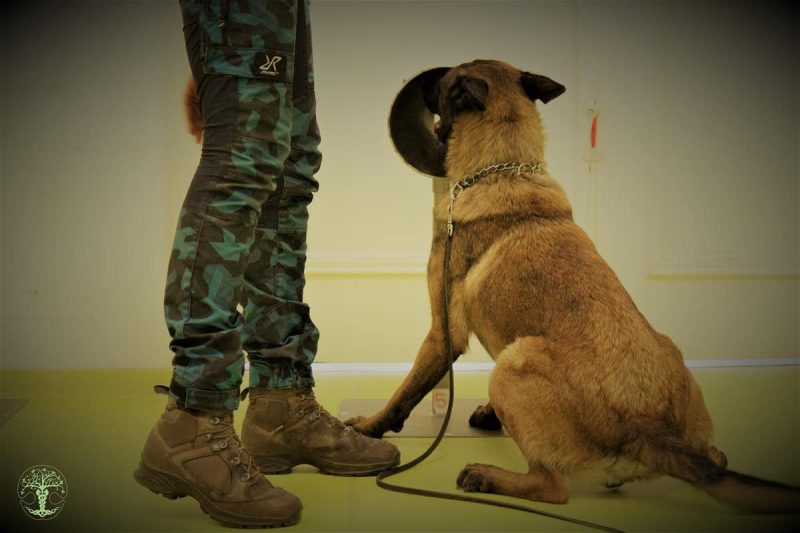
A friend to us (and science)
Perhaps we shouldn’t be surprised about dogs’ ability to detect Covid-19, as we already know their noses are amazing.
Dogs can help detect hypoglycemia in diabetics, warn people who are about to have an epileptic seizure and have been used to sniff out some cancers.
Their great potential in dealing with the current pandemic is just one of myriad examples of how dogs enrich our lives.
We acknowledge Professor Riad Sarkis from the Saint Joseph University (Beirut) and Clothilde Lecoq-Julien from the Alfort Veterinary School (France) for first conceiving the idea underpinning this work back in March.
Susan Hazel, Senior Lecturer, School of Animal and Veterinary Science, University of Adelaide and Anne-Lise Chaber, One Health Lecturer, School of Animal and Veterinary Science, University of Adelaide
This article is republished from The Conversation under a Creative Commons license. Read the original article.
Bottom line: Dogs are being trained to use their sense of smell to detect the novel coronavirus that causes Covid-19.
ooOOoo
To be honest, we humans just cannot fathom out what it is like to have a sense of smell that is 100 million times more sensitive than us!
So I can republish articles, such as this one, and we can be amazed, or whatever. But in truth we don’t have a clue. Not a clue!
I hope those scientists down under have a smooth experience with their very clever dogs!
I had heard that they are using dogs to detect COVID which isn’t surprising since they can smell certain cancers & predict seizures. Interesting article.
LikeLike
Susan, there is no doubt in my mind that the sense of smell is the attribute of a dog that defies our full understanding. Incredible!
LikeLiked by 1 person
I’ve been reading about additional projects with dogs being trained to sniff out the coronavirus (another program in South America). Dogs truly have gifted abilities on the sniff-front!
LikeLike
Monika, beyond our wildest dreams. One hundred, million times better than our sense of smell! As you write: “Dogs truly have gifted abilities on the sniff-front!”.
LikeLiked by 1 person
I loved reading this, Paul. I’m quite far behind the possibility of ever catching up but glad I didn’t miss this one. Of course there is no mention of training them here in the US. What a shame. Dogs impress me more than people every day of the week.
LikeLiked by 1 person
Thank you, Marlene. I think that it isn’t just the US that isn’t part of this training programme. I think that every other country North of the Equator is missing out. Congratulations to the University of Adelaide for this investment. And in response to your statement regarding dogs: They are amazing, incredible animals and thank the stars for their existence!
LikeLiked by 1 person